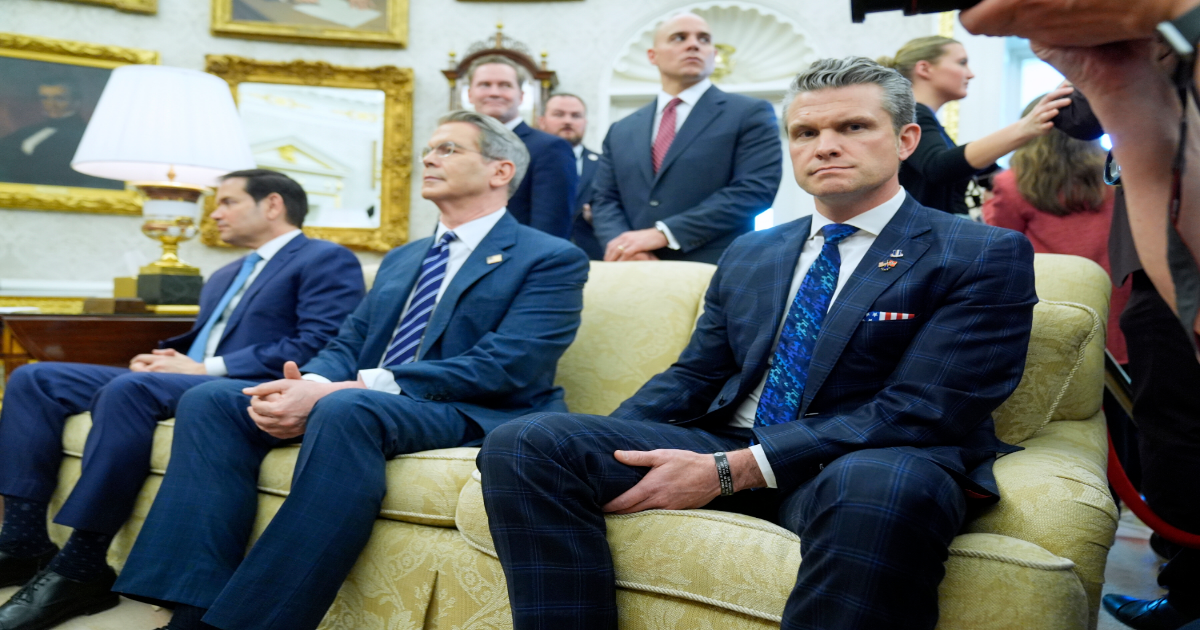The circle of top advisers in Defense Secretary Pete Hegseth’s orbit has shrunk in recent days to little more than his wife, lawyer, and two lower-level officials — leaving the Pentagon’s lead office without longtime expertise or clear direction.
Hegseth’s decision to fire three senior aides last week and reassign his chief of staff has blown a hole in his leadership team, severing essential lines of communication across the department and leading to fears about dangerous slip-ups such as weapons program delays.
The wholesale turnover just 100 days into Hegseth’s tenure has been remarkable for its speed. And it has left the first-time government official without trusted staff who understand Washington — just as he faces fallout from a series of scandals that have led to rampant speculation inside the building about how long he’ll keep his job.
“It’s a free-for-all,” said one person familiar with the office dynamics, who was granted anonymity to talk candidly about the situation.
Memos and actions that would have been routine in the past are getting delayed, the person said. Hegseth’s office is “up to its eyes” in what it can handle, with a parade of people flowing through the Pentagon chief’s third floor suite and no control over who is coming and going.
Hegseth’s closest advisers — beyond his wife Jennifer, a former Fox New producer, and his personal lawyer, Tim Parlatore, who he has commissioned as a Navy commander — are his old platoon sergeant from an Iraq deployment, Eric Geressy, and his former junior military adviser, Col. Ricky Buria. Hegseth’s brother Phil, a Department of Homeland Security liaison to the Defense Department, sits in an office nearby.
“Everyone has been jockeying for position,” said a second person familiar with the office dynamics, who was granted anonymity like others to discuss a sensitive issue.
The staff infighting and firings have led to a slowdown in paperwork moving through the system, the person said, including critical decisions on the Golden Dome, President Donald Trump’s signature effort to build a national missile defense system. The turmoil could also affect the rollout of the Pentagon budget next month, which is expected to rise to a record $1 trillion and include a major restructuring of the military’s procurement programs.
The staff instead is focused on building an aura around Hegseth by pushing out videos of his memo signings and early morning workouts, causing fears from current and former defense officials that some of the less photo-worthy events could face delays.
“The longer these positions sit vacant, the longer the department will be rudderless and without leaders who can provide cohesive direction,” said Chris Meagher, who served as the Pentagon’s assistant secretary for public affairs in the Biden administration.
The Pentagon did not respond to a request for comment.
Senior staff usually guide and prepare the secretary for meetings. They also supervise the dozens of special assistants and other advisers, and handle issues that rise to the attention of the office but might not warrant Hegseth’s involvement.
“They will do lots of pre-meetings and scope all the meetings in such a way that the main events don’t waste the secretary’s time,” said a former defense official who has served in similar roles. “They develop clear agendas and have some purpose to them. They write the secretary’s talking points and essentially enable he or she to run the meeting.”
In the past week, five top officials have left the Pentagon. Hegseth fired senior adviser Dan Caldwell, deputy chief of staff Darin Selnick, and the deputy secretary’s chief of staff, Colin Carroll, after a rivalry with the Defense secretary’s chief of staff, Joe Kasper, exploded into the open.
Kasper said in a Thursday interview that he was leaving the Pentagon immediately. John Ullyot, a former Pentagon spokesperson who had been sidelined in recent months, resigned from the agency last week.
The purge of officials has also hit Deputy Defense Secretary Stephen Feinberg’s office, which is still getting organized after he was confirmed by the Senate in mid-March. Hegseth’s decision to fire Carroll was not shared with Feinberg first, according to a defense official.
Bryn Woollacott MacDonnell, currently serving as the Pentagon’s comptroller/chief financial officer, has moved over to become Feinberg’s new chief of staff and will do both jobs until a replacement is identified.
The comptroller’s office is one of the few in the Pentagon that has no nominee waiting in the wings, as the White House has had trouble finding a suitable person to do the job, according to a person familiar with the issue. Feinberg is working to build out the rest of his staff and is expected to bring in at least one person from Cerberus Capital Management, the venture capital firm he founded and led until joining the Pentagon this year.
The uncertainty is adding to an already difficult atmosphere for career civilian and military officials.
“T]he uniformed military — from junior enlisted to four star generals — see right through these clowns, from their backstabbing and their inexperience to their cavalier treatment of highly classified information and their bungling policy rollouts,” said Alex Wagner, the former assistant Air Force secretary for manpower and reserve affairs during the Biden administration.
“I can’t imagine how I would be able to get anything enduring accomplished alongside the uniformed military if my colleagues saw me and my fellow appointees, including the secretary, as a punchline.”
The Joint Chiefs of Staff are one possible counterweight to the disruption, said a former Pentagon official. “They don’t want the department to fail, so they’re working in overdrive.”
The departures, the person said, leave “a vast hole.”
Daniel Lippman contributed to this report.
